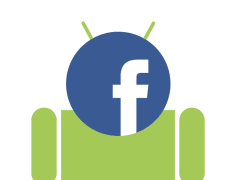Wednesday, May 15, 2013
Facebook's iPhone Culture Builds An Overzealous Home On Android
Facebook didn’t realize just how important
widgets, docks, and app folders were to
Android users, and that leaving them out of
Home was a huge mistake. That’s because
some of the Facebookers who built and tested
Home normally carry iPhones, I’ve confirmed.
Lack of “droidfooding” has left Facebook
scrambling to add these features, whose
absence have led Home to just 1 million
downloads since launching a month ago.
As I wrote in November, Facebook has
been desperately trying to get more employees
“droidfooding” — carrying and testing Android
devices. You can see the posters encouraging
employees to pick up a droid below. The issue
was that Facebook handed out iPhones to
employees for years. Facebookers could
request an Android handset, but otherwise
would basically get an Apple phone by default.
That wasn’t as dangerous years ago when the
iPhone still had more marketshare and
Facebook users, but since then Android has
rocketed into the lead. If Facebook wants to
reach the largest audience, it needs employees
living and breathing Google’s mobile operating
system.
The lack of droidfooders didn’t have serious
consequences until Home, Facebook’s new
“apperating system”. It replaces the lock
screen, homescreen, and app launcher of
compatible Android phones with a Facebook-
centric experience. It offers Cover Feed, a big,
beautiful way to browser the news feed the
second you bring your phone out of sleep. It’s
missing the ability to build real-time
information widgets, put your most used apps
in a persistently visible dock, or organize your
collection of apps into folders.
When I first tried out Home, I admit I was
wooed by Cover Feed and Chat Heads, while
those absent Android personalizations didn’t
phase me. Why? Because I’m an iPhone user.
First off, the iPhone doesn’t offer widgets at
all, so I didn’t really know what I was missing.
Second, I was running Home on a brand new
loaner “Facebook Phone”, the HTC First. I
didn’t expect to be able to port my iOS dock
and folders to Android. I accepted that my
experience would be somewhat
unpersonalized. I was naive.
The real problem? Facebook’s developers were
just as naive. Employees I’ve talked to admit
that iPhone users testing Home made
Facebook fail to see how wrong it was to
overwrite people’s widgets, docks, and folders.
Unlike working on some standard app, sticking
a new Android device in an employee’s hand
to test Home wasn’t sufficient. It needed long-
time, diehard Android users — something
Facebook doesn’t have as many of internally
as it would like.
On Thursday at Facebook headquarters, VP of
Engineering Cory Ondrejka and Director of
Product Adam Mosseri admitted this is a
critical flaw in Home — one that’s dissuading
people from downloading or actively using
Home, and that’s inspiring the 1- and 2-star
reviews dragging down Home’s rating the
Google Play store. Those reviews, and people’s
unwillingness to trade their personalized
Android launcher for Home has caused
Facebook’s apperating system to slip far down
the charts. It’s dropped out of the top 100
apps according to several analytics providers,
as Sarah Perez detailed yesterday.
“There a lot of feedback that not having a
Dock on Home is an issue” said Ondrejka. So
instead of spending its first few monthly
updates enriching Home with a better status
composer or starting to monetize it with ads,
Facebook’s team is backtracking. Instead of
pitching Home as something that ”replaces
the lock screen and home screen”, Facebook is
shaving it down into a thinner layer on top of
your existing phone.
To do that, first Facebook will offer a more in-
depth new user onboarding experience that
illustrates exactly how to access your other
apps. Next, it will introduce “Dock”, pictured on
the right. It’s a way for users to import their
old navigation bar of their four most frequently
used apps. Mosseri tells me Facebook doesn’t
want users to have to sacrifice the work they
did customizing their Android in order to use
Home. Eventually, expect Facebook to add an
app foldering system or folder importer to
Home, as well as a way to display widgets.
“We wanted to ease the transition from your
old launcher to your new launcher,” said
Moserri of the planned changes. Facebook
would have known to make that s priority
before Home launched, but its iPhone culture
meant there was no one to cry foul. Team
members didn’t have old launchers to
transition from.
Home has big potential. People who do get by
its shortcomings and settle into Home see a
25% increase in the time they spend on
Facebook. But it’s stuck at under 1 million
downloads and likely many fewer active users
because its overly aggressive invasion of
Android scares people away.
Never has it been more apparent. If Facebook
can’t get Androids in more pockets at 1
Hacker Way, it will continue to misstep in
mobile.
source:techcrunch.com
Labels:
Mobile Phones n Tablets,
News,
Technology
Subscribe to:
Post Comments (Atom)

No comments:
Post a Comment